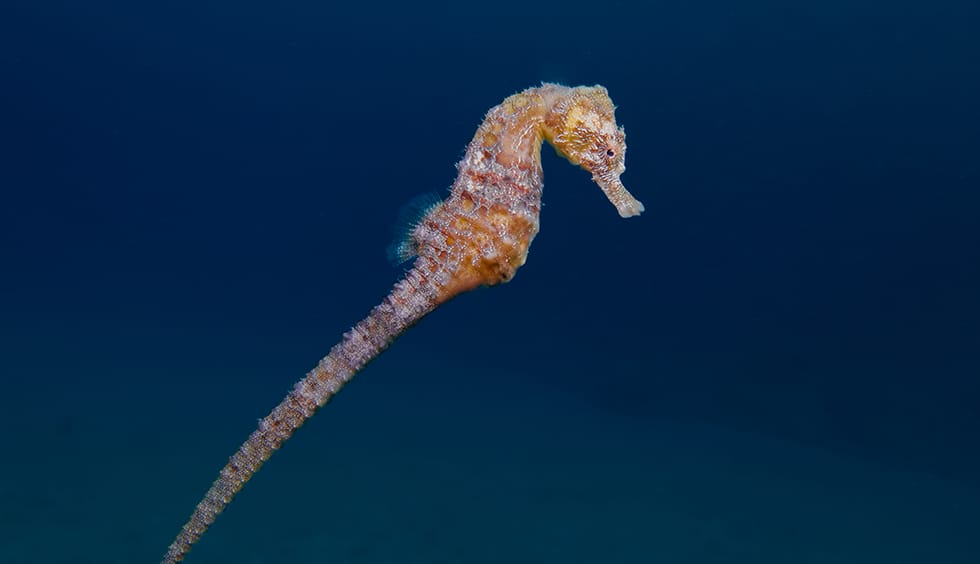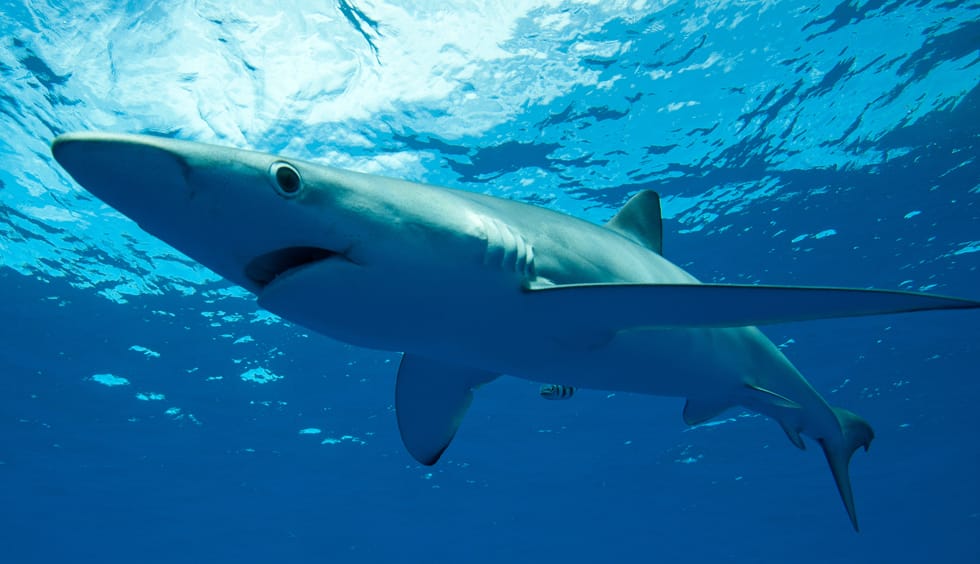Have you ever wondered what secrets the Mediterranean hides under its waters?
In Mallorca, the answer is a true underwater paradise. With a biodiversity that surprises both experts and the curious, this island has earned a privileged place in the hearts of those who love marine nature. Not in vain has it been described many times as a miniature ocean due to its richness of species.
Colorful fish, Posidonia meadows, monk seals and even impressive sharks that majestically patrol the deep waters.
Mallorca offers a unique show that you won’t want to miss. And no, you don’t have to be an expert diver to enjoy it: with activities like snorkeling, boat trips or guided diving, there are options for all levels.
In this article, we invite you to immerse yourself, even if only with your imagination, in the fascinating marine life of Mallorca.
Discover what species await you, where to find them and, yes, how sharks become unexpected protagonists of this ecosystem.
Get ready to fall in love with the underwater world like never before.
Main marine ecosystems of Mallorca
Mallorca dazzles not only for its paradisiacal beaches and coves, but also for the underwater ecosystems that make its waters a haven for biodiversity. If you delve into its marine world, you will discover habitats full of life and beauty, each one with a vital role in the balance of the ecosystem. Here we present the most outstanding ones:
1. Posidonia oceanica meadows: World Heritage
The typical turquoise tone of the waters of Mallorca and other Balearic Islands is due to these natural plants.
Beneath the Mediterranean waters lie vast meadows of Posidonia oceanica, a marine plant endemic to the Mediterranean that not only beautifies the underwater landscape, but also acts as the lungs of the sea. These meadows generate oxygen, protect the coast from erosion and offer refuge to numerous species, from small fish to colorful seahorses.
Because of its ecological importance, Posidonia is protected and recognized as a UNESCO World Heritage Site. By swimming or diving over them, you not only contemplate a natural spectacle, but you also contribute to value a treasure that needs our protection.
2. Underwater caves and reefs
The Mallorcan coastline hides a labyrinth of underwater caves and reefs that look like something out of a dream. These formations offer a home to an incredible variety of marine fauna: octopuses and lobsters take refuge in the crevices and colorful fish inhabit the reefs. All together they form a visual spectacle unique in the world.
Caves such as Sa Gleda or Cala Varques are very popular with divers but if you prefer to stay on the surface, the reefs near the coast are ideal for a snorkel full of surprises.
3. Deep waters and their mysterious fauna
Beyond the coastal areas, the Mediterranean transforms into a world of deep waters inhabited by fascinating creatures.
This is where sharks make their appearance, majestically patrolling in search of prey.
Although less accessible to the casual visitor, this ecosystem is essential to maintaining the balance of the entire marine food chain.
Sharks in Majorca: What species can you find?
Let’s see in detail what types of sharks inhabit the Mediterranean Sea:
-
The blue shark
It is a curious predator usually associated with the open sea and one of the most fascinating and frequent species in the Mediterranean. It also visits the waters around Mallorca, becoming an essential part of its marine ecosystem.
The common name comes from the blue color of the skin, unique among sharks. Their body is slender and streamlined, allowing them to move gracefully and quickly. Although they can reach lengths of up to 4 meters, blue sharks specialize in relatively small prey, including small fish and small squid. However, they can hunt larger prey if necessary.
As a top predator, the blue shark helps maintain balance in the food chain, controlling populations of smaller species and contributing to the overall health of the marine ecosystem.Blue sharks are known to have highly migratory behavior and individuals often move between the Atlantic and the Mediterranean.
The blue shark is considered a shy species and not aggressive towards humans. Although their size commands respect, encounters with people are extremely rare and are usually completely harmless.
They prefer to avoid human contact and will only approach if they are curious or looking for food in waters where organic remains are discarded (such as during fishing) but will very rarely attack a human.In Mallorca, sighting a blue shark is a rare but possible event. Our recommendation: If you want to increase your chances of seeing one, opt for guided excursions on the high seas.
-
Mako shark
t is one of the most impressive predators that can be found in the Mediterranean waters, including those of Mallorca. This shark stands out for its speed and strength, being one of the most fascinating for both biologists and marine life enthusiasts.
They usually measure between 2 and 3 meters, although some specimens can reach 4 meters and it is the fastest shark in the world.
The shortfin mako shark prefers deep, temperate waters, which makes the Mediterranean a suitable place for it. Although it does not usually come close to the coast, it can occasionally be sighted in remote areas of Mallorca during maritime excursions.It feeds mainly on large fish such as tuna, mackerel and swordfish.
They avoid contact with people and prefer to focus on their natural prey, but being a wild and very fast animal, we recommend respecting their space if they give a sighting.The mako shark is a symbol of the strength and beauty of the Mediterranean, but also a reminder of the fragility of marine ecosystems and the need to protect them from fishing and pollution.
-
The hammerhead shark
With its characteristic “T” shaped head, it is one of the most iconic and recognizable sharks in the world. Although it is not as common in Mallorca’s waters as other species, there are occasional records of its presence in the Mediterranean, making it a fascinating visitor worthy of attention.
The deeper waters to the south of the island, near the Cabrera National Park, are potential places to find them passing through during their migration. -
The basking shark
It is one of the most impressive species for its size and harmlessness. It is the second largest fish in the world, after the whale shark. It can reach 12 meters in length and weigh up to 6 tons, although the most common specimens usually measure between 6 and 8 meters.
Although it is not a permanent resident of the Mediterranean, some populations pass through this region during their routes.
It is completely harmless to humans as its diet is based on plankton.
Myths and facts about sharks in Mallorca
Sharks are sometimes portrayed as relentless and dangerous predators. However, the reality is quite different, especially in the Mediterranean and the waters off Mallorca.
- Myth: Sharks in Mallorca are aggressive and pose a constant danger.
- Reality: Most of the sharks that inhabit or visit the Mediterranean, such as the blue shark or basking shark, are harmless to humans. Attacks are extremely rare, and when they do occur they are usually due to misidentification or curiosity about the animal.
- Myth: There are few sharks in the Mediterranean because it is not their natural habitat.
- Reality: The Mediterranean, as we have already seen, is home to more than 40 species of sharks. Although their numbers have declined due to fishing and pollution, they have been part of the ecosystem of these waters for centuries.
- Myth: If you see a shark, it is looking to attack.
- Fact: Sharks are shy animals and, in most cases, flee in the presence of humans. Seeing one near shore is usually an unusual event and not a sign of danger.
If you are lucky enough to spot a shark while swimming or on a marine excursion, follow these recommendations:
- Stay calm. Sharks are not aggressive by nature. They tend to ignore humans if they do not feel threatened.
- Watch from a distance. Do not try to approach or touch them. Respecting their space is essential for your safety and their well-being.
- Avoid sudden movements. If you are in the water, swim slowly toward the shore or toward your boat without agitation.
- Do not feed or provoke them. This can alter their natural behavior and create unnecessary risks.
Other fascinating species of marine life in Mallorca
As you can imagine, Mallorca’s marine wealth is not limited to sharks. Its waters are home to a spectacular biodiversity, ideal for diving and snorkeling lovers.
Outstanding fauna in Mallorca
- Fish: Groupers, gilthead breams and barracudas are common in the reefs and rocky bottoms.
- Sea turtles: Although they are occasional visitors, loggerhead turtles are seen in spring and summer.
- Octopuses and cuttlefish: Camouflage experts, these cephalopods are common in areas of sand and posidonia.
- Seahorses: Shy and charming, they are usually found in posidonia meadows. Of course, they require a watchful eye.
Underwater plants
- Corals: Especially in caves and deep areas, they stand out for their vibrant colors.
- Posidonia oceanica: we have already told you about it and that it is an essential marine plant for the ecosystem and a refuge for many species.
Where to see them
- Diving areas: The marine reserves of Cabrera and Dragonera are ideal for discovering this fauna and flora in its maximum splendor.
- Snorkeling: Beaches such as Cala Mondragó or Cala Varques offer calm waters rich in biodiversity close to the coast.
Protection and conservation of marine life
Marine life in Mallorca is facing several threats that endanger the biodiversity of its waters:
- Pollution and climate change: plastic and chemical pollution are severely affecting marine fauna, while rising water temperatures are altering natural habitats.
- Overfishing: Overfishing is reducing populations of key species and disrupting the balance of marine ecosystems.
However, there are important efforts to protect this invaluable ecosystem.
Several organizations, such as Sea Shepherd and Cabrera National Park, conduct research and activities to protect the island’s marine species and habitats.
As a visitor, you too can contribute to its conservation by:
- Opting for low-impact activities such as responsible diving and snorkeling.
- Respecting the fauna and flora. Don’t touch or disturb marine habitats, avoid leaving trash and respect local rules for the protection of the environment.
Everyone’s commitment is crucial to ensure that Mallorca’s waters remain a haven for its rich marine life.
Live the experience of exploring the marine life of Mallorca
Mallorca is a unique destination where the sea reveals a fascinating world full of life and color.
Every underwater corner offers an opportunity to marvel and learn. However, it is crucial to do it in a respectful way, taking care of its biodiversity and protecting its fragile ecosystem.
We invite you to discover the magic of the Mediterranean Sea by participating in guided excursions, visiting the natural reserves of Cabrera and Dragonera.
In our boat experiences we try to give information about marine life, posidonia meadows and the consequences of marine pollution if you are interested in the subject ask our skippers.
Make your visit to Mallorca a sustainable and enriching adventure!

